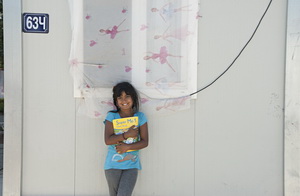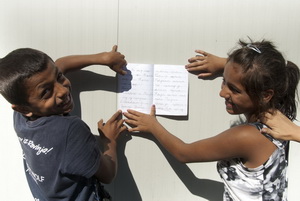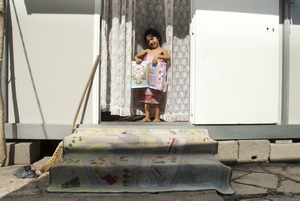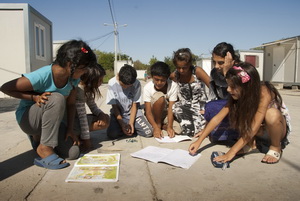By Olga Belosavic Milanovic
Photo © Bojana Andric
A joint project of the Belgrade Education Department, Children’s Centre Mali Princ, and the Roma Education Fund continues this year through activities aimed at providing learning support, preparing children for preschool education, and empowering mothers to take charge of their children’s early development in Roma settlements in and around Belgrade, Serbia.
“What’s your name?”
“My name’s Ibrahima.”
”What class are you in?” our assistant asks.
”I’m in second grade!” Ibrahima replies in Serbian. She’s eight years old and has finished the second grade of elementary school.
”After school we come here and do our homework. I always do mine with my brother. But we also have an assistant who helps us. She comes here and then we do homework together.” Ibrahima continues and points to one of the containers where children gather to study together.
A lot of children seemingly come from nowhere, surrounding Ibrahima.
Mirjeta is the elementary school third-grader. ”My scores were all Bs this year. I go to school because I can play with my friends there. We study together. When my teacher tells me to read, I read, and sometimes she tells me to come to the chalkboard and asks me questions. I have one friend at school who’s from the same settlement, others I’ve met at school.”
Nikola and Ali are pushing their way to stand closer to the girls. They’ve got As in Serbian and Math from their teacher Zorica. They’re both sixth-graders and plan to become mechanics one day.
These are just some of the children participating in the program “Support to the Integration Process of the Children and Mothers Displaced from Gazela Settlement” that is being implemented by the NGO Children’s Center Little Prince, in cooperation with the Education Department of the City of Belgrade and the Roma Education Fund from Budapest (REF). The second phase of the project has started this autumn in all five settlements (Makiš, Barajevo, Boljevci, Kijevo, and Mladenovac) where Roma were resettled after being evicted from their homes under Belgrade’s Gazela bridge. Three years later, their living standards have improved somewhat, but the greatest progress has been made in terms of their children’s education.
Apart from support provided by the City of Belgrade – school buses, school stationery and pedagogical assistants assigned to each of the seven schools that these children attend – the program provides continual learning support in the form of five mediators who help the children with school assignments, language learning, and studying.
Slavica Lola Vasić, from the Little Prince NGO, emphasizes three key elements of the new project: empowerment of mothers for their children’s early education, additional support to preschool children in learning concepts and subject-matter needed for the elementary school entrance exam, as well as providing support to pupils in learning the language and studying.
“The children now have an assistant at school, as well as a mediator in the settlement,” she says. “We believe that this will considerably improve the situation. This year, and in cooperation with the Belgrade Education Department, 175 teachers will undergo training for work with the Romani children. This is a good example of cooperation between an NGO and governance on a project. The importance of the support and preparation for the regular school attendance is best illustrated by the fact that, after three years of working with the children displaced from Gazela settlement and settled in Makis, all of them now attend school regularly.”
She adds, “The fact that is not a secret, and is easily forgotten when it comes to Roma children, is that all children in the world are the same and have the same needs. They need adult support, so that one day they can become adults as well. For this reason, all members of the Children’s Center Little Prince are trying to provide, together with parents, teachers and the pedagogical assistant, the necessary support for these children.”
“It’s very important when the school gets a message from the Education Department that this is a project that the school should take part in, that the project is important, because this is how synergy is made that gives good results,” remarks Gordana Cvetković, Head of the Education Department. She continues: “The goal was to achieve regular school attendance and increase the percentage of children who finish elementary school, but the cooperation with parents was most important for the schools. Good contact with families and access to Roma settlements were crucial for the schools, as they can communicate with both the children and their parents.”
Pedagogical assistants who help all children from marginalized groups to adjust to the school system are also very important. Svetlana Marinković, pedagogical assistant from “Braca Jerkovic” elementary school in Belgrade, says that what is important is not only to help children, but also to establish communication with the parents who, more often than not, need an explanation why education is so important.
“Being Roma helps me a lot in communicating with the children,” she says. “When they have someone who looks like their mom or their sister, they open up to you more easily, share their problems with you, which helps us find adequate solutions. I do attend their lessons, but also work with them after the lessons on improving their knowledge of Serbian and I also help them with homework.
“It is crucial that the children get to like their mediators. We had one girl for school testing, and she was really well-prepared. When asked who had prepared her so well, she replied, ‘My teacher Mersida, she comes to our home and then we all study together.’”
Žaklina Jašarević, leader of the Makis Roma settlement, lives in one of the containers and she represents the interests of the Makiš Roma at Belgrade City Hall. She says that the children’s education program is an excellent opportunity that the parents of the children included in the program have never had.
“Parents are not strict,” says Žaklina. “Our living conditions were much worse before as we were living in the settlement with very little hygiene. It’s different now and we’re all aware that this is a great opportunity for us and our children. The parents used not to send the kids to school on bad weather, but now it happens very rarely. The City of Belgrade has also contributed a lot. We are far from the city, but we do have school buses that take the children to and back from school, which helped our children attend school regularly.”
Many children have taken the whole thing very seriously as well. Nazifa, who is seven and who does not speak Serbian well enough, still goes to school regularly; even if she has a fever, she doesn’t want to miss school, says Žaklina.
“I like to go to school, to draw and write,” Nazifa says shyly. Then she adds, “I’ve learnt how to write letters!” Then she becomes shy again and runs back to the container where she lives with her family.
Insufficient knowledge of Serbian is one of the problems Romani children face when they start school. Slavica Lola Vasić says that the Romani children who they are working with are not children who do not speak Serbian, but their vocabulary is very limited: “Nobody read Little Red Riding Hood to these kids. Their mothers don’t read fairy tales to them. They don’t discuss various concepts with them. We do not teach them Serbian; we explain concepts to them, especially the ones used in the lessons. This is where the improvement is most visible. The teachers, during our formal and informal conversations, all observed that the children read better, write better, and use new words and phrases in everyday communication.”
Compared to their parents, this is a great advantage.
Pašije Tahiraj, the mother of the little Ibrahima, says she is very happy that her children attend school and know things that they don’t know.
“All she’s doing, she’s doing for herself!” she concludes. “She must listen to her teacher. I would like her to be a good pupil, to obey the teachers, and do her assignments. It’s difficult for the children to go to school. They have to study and they have to work hard. Here in the settlement, it’s very difficult to make them do their homework.”
Hamza Nasibe, a mother of five, agrees with her. Her oldest daughter has started high school, while the other four attend the first, second, third, and fourth grades of elementary school, respectively: “The four younger ones are a handful. But every day I can help them a little. Help them with homework. The teachers who come to our home help a lot as well. It’s very important for me that the kids should go to school and learn properly. I’m proud of my oldest daughter. She’s in high school now, vocational education, to become a manicurist and pedicurist one day. The younger ones want to follow in her footsteps. But they have to study harder if they want to be good,” Hasibe says.
“The problem in Makiš settlement now is not poor school attendance, but premature school leaving. This is the second important problem that Roma community in Serbia is faced with,”’ says Nataša Kočić Rakočević from the Roma Education Fund. “It’s important that the children do not quit school. While they do start school regularly, there are cases of school leaving between the fifth and the sixth grades. The eighth grade is also critical. The reason for this is mostly in the fact that school curricula are not adapted to Roma children,” Kočićeva concludes.
Regular school attendance, education of both parents and children, and working with teachers and learning support were among the REF’s top priorities in the last school year. They remain the same this year, too, but also include an additional program to work with mothers whose children are under age five to reach the milestones of early childhood development.
“We teach the mothers to be their children’s first teachers. For children from marginalized groups, the compulsory preparatory preschool program, which lasts one year, is not enough. It must be longer and start with their parents. We believe that we could start a campaign to extend the preschool training to last two years, and to include more Roma children in the preschool institutions. If a child improves by the time he/she starts school, it means that the child will be able to do other things as well. He/she will be able to show what they can do,” concludes Slavica Vasić from the Little Prince NGO. “This year, as was the case during the last year, the children displaced from the unhygienic settlement Gazela will continue with their programs. We hope that their new next-door neighbors from the Belville settlement will soon start with similar programs of integration and education.”
 Government of the Republic of Serbia
Government of the Republic of Serbia



















 pdf [271 KB]
pdf [271 KB]
Leave a Comment